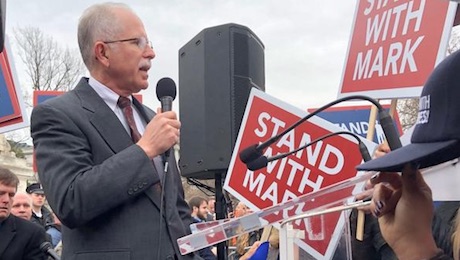By Christian Wade | The Center Square
A pair of New Hampshire state workers are asking the U.S. Supreme Court to order a labor union to refund them for dues taken out of their paychecks.
The class-action lawsuit, filed against the State Employees’ Association of New Hampshire by the National Right to Work Legal Defense Foundation on behalf of two state employees, seeks up to three years worth of union dues they say were taken without their consent in violation of a landmark 2018 Supreme Court ruling that did away with the required payments.
The suit seeks refunds for Patrick Doughty and Randy Severance as well as other state workers who didn’t want to join the labor union but still had to pay dues.

Mark Janus, the plaintiff in Janus vs. AFSCME, won a case before the U.S. Supreme Court in 2018, which ruled public sector workers cannot be forced to pay fees to unions that represent them in collective bargaining.
“Union bosses violated the rights of workers in New Hampshire and across the country for decades and now they must return a few years of those ill-gotten gains,” Mark Mix, the foundation’s president, said in a statement. “The Court should grant Doughty and Severance’s petition and make it clear that union bosses cannot simply pocket the proceeds of their unconstitutional forced dues scheme.”
In a court filing, the workers ask the high court to overturn lower court rulings that have so far rejected workers’ refund claims, arguing that “if lower courts can manipulate constitutional claims to achieve what they feel is the best policy, many victims of civil rights abuses will be left remediless.”
The U.S. Supreme Court in 2018 ruled that public sector workers cannot be forced to pay fees to unions that represent them in collective bargaining.
The court’s decision ended a provision in 21 other states that required public employees to pay what’s known as “fair share” fees as a condition of employment, even if they don’t want to be union members. Union leaders say the fees are meant to help offset the costs of bargaining and contract administration that benefit all federal and state government workers.
But the ruling doesn’t affect private sector unions unless they represent workers in one of the 27 states that have ‘right to work’ laws.
The New Hampshire Legislature is considering a proposal that would update the state’s labor laws to give workers at private companies the “right to choose” whether or not to join unions and pay required collective bargaining dues.
Americans for Prosperity-New Hampshire is among the pro-business groups pushing for the changes, which it says will “protect worker freedom” and improve the state’s economic competitiveness. Republican Gov. Chris Sununu, a longtime backer of ‘right to work’ restrictions, is expected to sign the measure if it reaches his desk.
Mix said the lawsuit wouldn’t be necessary if the state had a right to work law “that ensures union membership and financial support are voluntary, not coerced.”
“Had union dues been voluntary during the period covered in the lawsuit, union officials could not have seized forced fees from unwilling workers to begin with,” he said.


